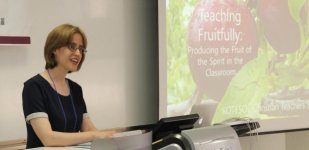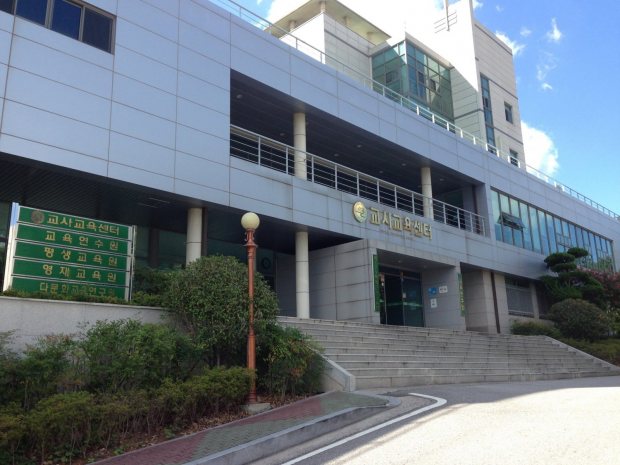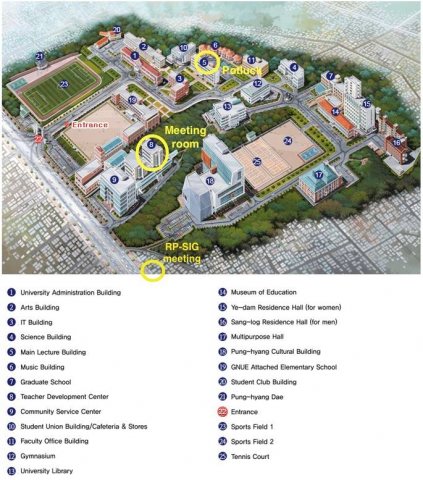
Gwangju-Jeonnam Chapter September Meeting
.
––– Morning Reflective Practice Session –––
Reflective Practice SIG at the Gwangju Biennale
September 8th, 9:30 a.m. Details HERE and HERE.
Maria Lisak Facilitating.
––– MAIN MEETING SCHEDULE –––
Time: 2nd Saturday, September 8, 2018, 1:45ㅡ5:00 pm
Location: Gwangju National University of Education (GNUE), Teacher Training Center (교사교육센터) 1st Floor; Room 811. Detailed directions HERE.
1:45 pm: Sign-in and Meet-and-Greet (Admission: Free for newcomers. Membership welcomed.)
2:00ㅡ2:50 pm: Presentation 1: Part One
ㅡ Competition and Cooperation in Classroom Activities
ㅡ Heidi Vande Voort Nam (Chongshin University, Seoul)
2:50ㅡ3:10 pm: Refreshment Break
3:10ㅡ4:00 pm: Presentation 1: Part Two
ㅡ Competition and Cooperation in Classroom Activities
4:10ㅡ4:30 pm: Presentation 2
ㅡ Achievement Goals and Foreign Language Performance Among High School Students
ㅡ Mikyoung Lee (University of Munich)
4:30ㅡ4:45 pm: Swap-Shop Presentations
Share your Teaching Ideas, Classroom Activities, and Teaching Wisdom with the group.
(Everyone is encouraged to share [up to 5-6 min. each]. Short tidbits are welcomed. Handouts also welcomed.)
4:45 - 5:00 pm: Announcements / Drawing for Door Prizes / Closing
(After-Meeting Dinner for those who wish to participate. Venue: The First Alleyway)
![]()
Session Summary
Competition and Cooperation in Classroom Activities
Heidi Vande Voort Nam
Competition is often used to make classroom tasks more engaging and game-like. Although this competition can create a classroom buzz, it may also negatively affect motivation and relationships among students. Fortunately, competition between students is not the only way to give activities a motivating, game-like feel. In fact, cooperation itself can make activities seem more game-like. This workshop will present several alternatives to direct competition between students, such as competition against a clock or against a personal record. It will also identify features, such as interdependence among teammates, that make activities truly cooperative. Workshop participants will experience more competitive and more cooperative variations of a classroom activity. Then they will evaluate the cooperative and competitive elements in other activities. Finally, they will propose ways of making these activities more cooperative while retaining the elements that make the activities engaging.
The Presenter

Heidi Vande Voort Nam holds an MA TESL/TEFL from the University of Birmingham. She currently teaches in the Department of English Education at Chongshin University, where she prepares English education majors for student teaching and for the national English teachers’ exam. Heidi also teaches beginner-level general English courses, including special courses for North Korean and Chinese students. Within KOTESOL, Heidi serves as a presenter for KOTESOL Teacher Training (KTT) and facilitates KOTESOL’s Christian Teachers Special Interest Group (CT-SIG), a group that hosts meetings and online discussions for Christian English teachers. Heidi lives in Seoul with her husband TaekHyeon Nam, who is a public high school English teacher, and their children, Joseph and Miriam.
Session Summary
Achievement Goals and Foreign Language Performance Among High School Students
Mikyoung Lee
Achievement goals have been fairly well researched in motivation literature, demonstrating that the achievement goals that students adopt influence their motivation and performance. Research in foreign language learning (FLL) also has shown that goals are relevant in English learning and ultimately influence academic performance. Nevertheless, research on this significant motivational factor among Korean students has received little attention. This study examined the relationships between achievement goals and academic performance among 228 Korean high school students. Structural equation modeling was conducted to test the hypotheses. The findings showed that mastery-approach and performance-approach goals correlated positively with performance, whereas performance-avoidance goals correlated negatively. The findings indicate that students’ achievement goals in FLL are significantly associated with academic performance, emphasizing that teachers should consider these motivational aspects in their instruction.
The Presenter

Mikyoung Lee received her PhD in educational psychology at the University of Munich, her MA in TESOL at Sookmyung Women’s University, and her BA at Yonsei University. She is currently working as a guest researcher in the Department of Educational Psychology at the University of Munich, Germany, and doing collaborative research at Chonnam National University, Gwangju. Her main research interests are foreign language acquisition, achievement goals and emotions, and teacher emotions and emotional regulation. She has written book chapters on English teachers’ emotions and emotional labor, and published her work in international journals including Educational Psychology, Social Psychology of Education, International Journal of Multilingualism, and Korea TESOL Journal among others. She has also presented her research at international conferences of the American Educational Research Association, the European Association for Research on Learning and Instruction, and KOTESOL.
___________________________
Photo: The Gwangju National University of Education (GNUE / 광주교육대학교), Teacher Training Center (교사교육센터), venue for our main meeting ㅡ 1st floor, Room 811.




